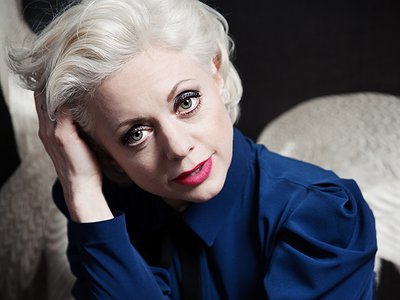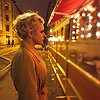Could you take us through a day in your life, from a possible morning routine through to your work? Do you have a fixed schedule? How do music and other aspects of your life feed back into each other - do you separate them or instead try to make them blend seamlessly?
My life is routine-based in periods. It depends on if I am performing, or am having a writing period. When I work in the theatre or tour with my band, I try to rest during the day to stay healthy. To take care of my voice I can not fill the daytime with meetings and too much talking. It is my instrument, and I have to guard it. A routine day while performing in Oslo can look like this: I get up with my son of 9 years, make breakfast and see him off to school. After that I often exercise, answer some emails, prepare for tonight's work, and try to do what other people do in the evening, when I am at work; relax. Then I make dinner, and I leave right after that to go to work. When I am in a writing process, I also get up early and work the whole day until my family comes back. Sometimes I can not sit still, I have to get out of the house to think better.
When I am in the midst of a composition or a new text, the process continues also after «working hours». I have often disrupted a conversation or got up in the middle of the night to run to the piano and test out a melody line or write down some new words. The creative process never sleeps, especially when something is hard to solve.
Could you describe your creative process on the basis of a piece or album that's particularly dear to you, please? Where did the ideas come from, how were they transformed in your mind, what did you start with and how do you refine these beginnings into the finished work of art?
I write music based on stories from my personal life. When I look back on my 10 released albums, they are all connected to what happened that year and sometimes to what my dreams were. «Red Lips, Knuckles and Bones» derived from a year where I lost three friends that were important to me. They were all mentors, people who made me believe in myself and inspired me with their own work. One of them was the painter and contemporary artist Pushwagner, who also made the cover art for «Don’t Stay For Breakfast». Pushwagner was a pop artist who made strong, colourful and often satirical art criticising our time. Warfare and capitalism brainwashing the human race was a dear topic to him. The day he died I wrote the song «Pink Push Wagon», which we performed during his funeral which was broadcast on NRK.
I think Hariton Pushwagner leaving this world also marked this album in terms of the lyrics. It made me more aware that I have a responsibility as an artist to address the times we are living in. This made me shift my perspective when writing the lyrics, addressing topics like feminism, gun politics and the refugee wave to mention some. My motivation for making music has always been the lyrics, but sadly, I rarely read a jazz journalist addressing mentioning them. To me, that is like interpreting a work only through some of its ingredients.
There are many descriptions of the ideal state of mind for being creative. What is it like for you? What supports this ideal state of mind and what are distractions? Are there strategies to enter into this state more easily?
I think inspiration can be moody. Sometimes, everything around me is perfect, and still, I can not write a single note. At the same time, I get ideas doing something very ordinary, like taking the tram across town. But writing the whole story, moving on from that idea, demands a real kick off, like starting an engine. That is why I often travel when I am in the beginning of a new project. For this album, Anders Aarum and me went to Budapest for a week, just to be able to spend every waking hour focusing on creating. We mainly worked on separate projects, but we did make the last track on this album together; «Rich». Being in a new place with no attachments and mostly strangers around me makes me feel more alone and more free when I am writing. When I get the «engine running», my brain works what ever I do.
How is playing live and writing music in the studio connected? What do you achieve and draw from each experience personally? How do you see the relationship between improvisation and composition in this regard?
Through a period of concerts I always learn something new about the songs I have written, and what I want to do next. What parts seem to communicate best with the audience, and what kind of moods are more inviting to us as a band to develop further. Playing live often gives me ideas of grooves and moods that I would like to explore, and the improvisations of my fellow musicians can often become the inspiration of a new song. But a song always starts off with a story, in my place. I have tried sometimes to write a lyric on an existing melody or a musical idea, it doesn’t come easy to me.
How do you see the relationship between the 'sound' aspects of music and the 'composition' aspects? How do you work with sound and timbre to meet certain production ideas and in which way can certain sounds already take on compositional qualities?
This is a part of the process that comes when rehearsing with the band, because my songs are very much finished when we start exploring different instrumentations. But we often spend a lot of time finding the right instruments to go with the theme and the atmosphere of the song. A few times, I have gone home after rehearsal and re-written parts of the song, but I think that has more to do with feeling what fits the sound of the band as a whole, and not particular sounds.
Our sense of hearing shares intriguing connections to other senses. From your experience, what are some of the most inspiring overlaps between different senses - and what do they tell us about the way our senses work? What happens to sound at its outermost borders?
Music speaks to my heart and it influences my emotions very strongly. Music can be mental magic. If I walk into a place where they play the «wrong» music, I have to leave. If I put on the «right» song when I am out running and getting really tired, I can run another 3 kilometres without blinking. I think the overlap between sound and motivation, both physically and mentally is the most important overlap to me.
Art can be a purpose in its own right, but it can also directly feed back into everyday life, take on a social and political role and lead to more engagement. Can you describe your approach to art and being an artist?
I think art has a responsibility to comment and criticise and make people think. But making people feel good about them selves for a short time can be just as engaging and important. To me this is the most important thing; to surprise people and making them go through different emotions during the concerts, but always leaving with a smile on their faces.
I think this depends on the artist, and that there is room for all kinds.
It is remarkable, in a way, that we have arrived in the 21st century with the basic concept of music still intact. Do you have a vision of music, an idea of what music could be beyond its current form?
I think you just stated how important music is to humans. It has lived in its simple form, although elaborated, for thousands of years. I think our time is using music in new and important ways, in therapy, in learning and for inspiration in workplaces. I hope this development continues, and that music will take on a bigger role in education for children. It comes so natural to them. I really believe there should be a lot more music in school. Music motivates and reaches our intellect in a broader sense than the written word.



